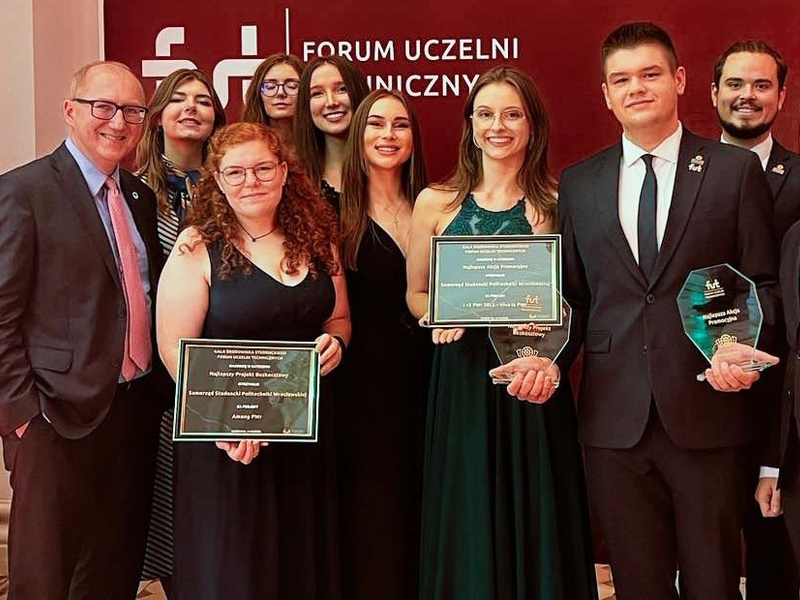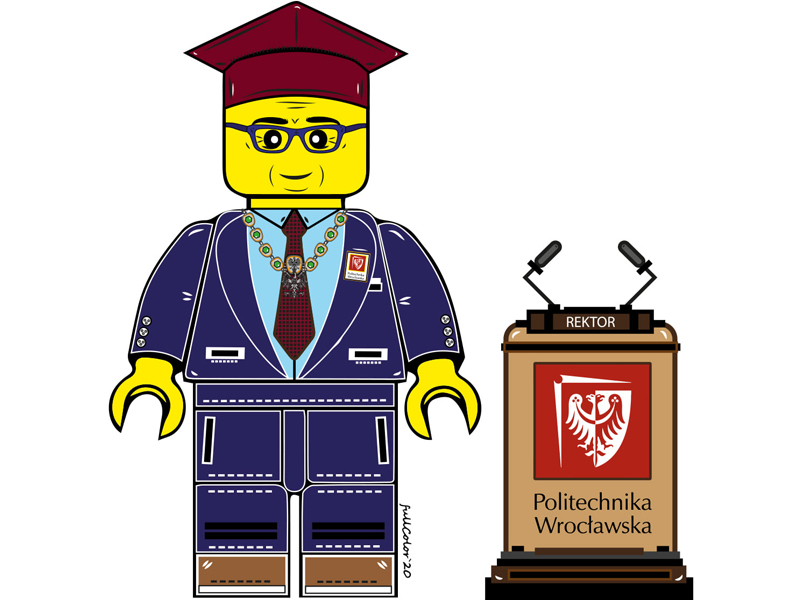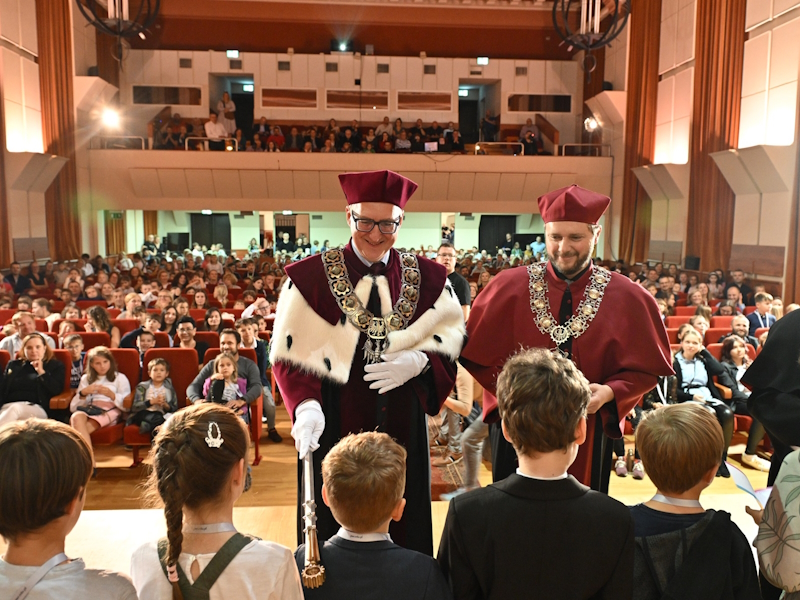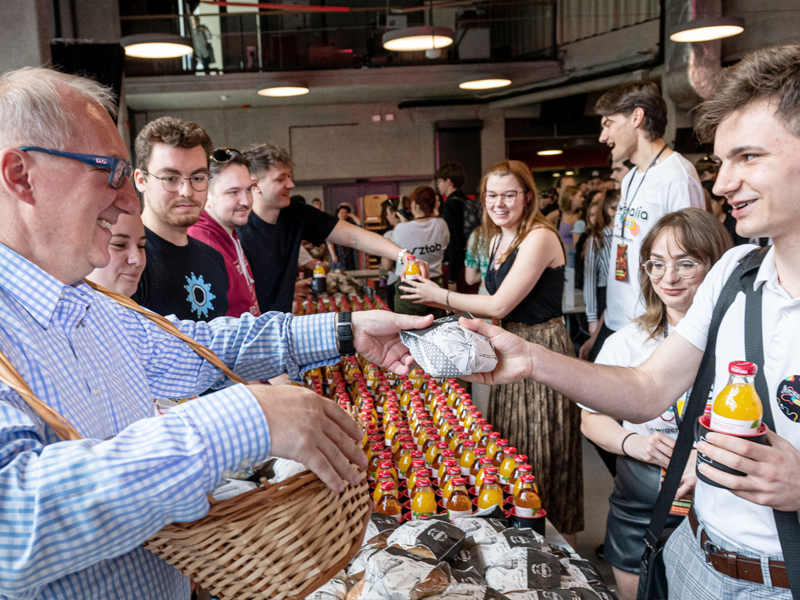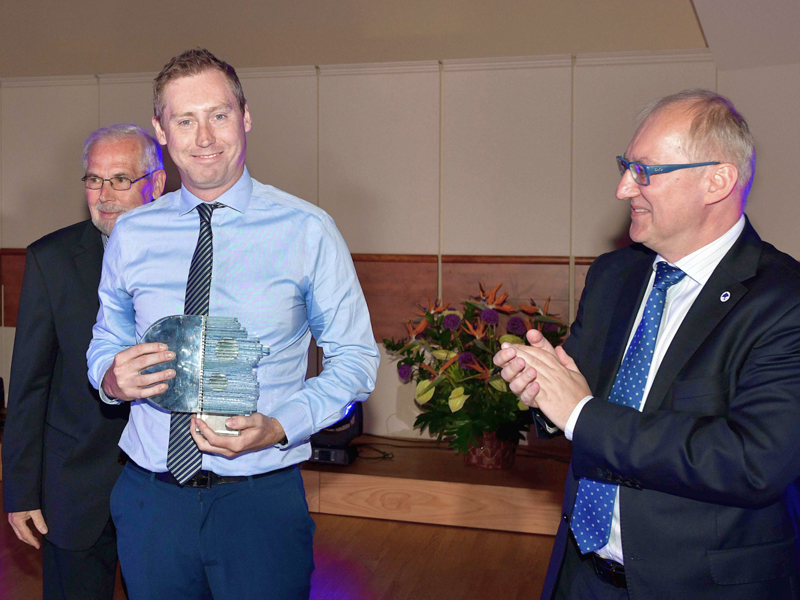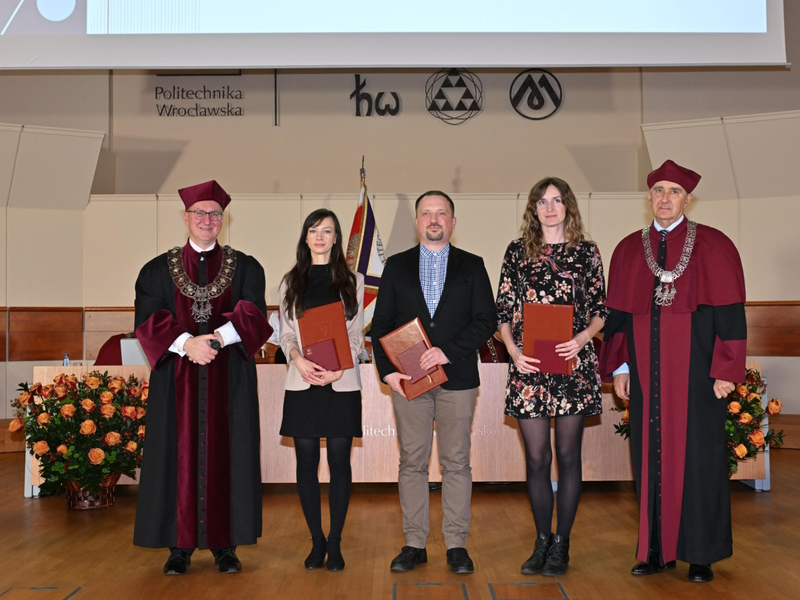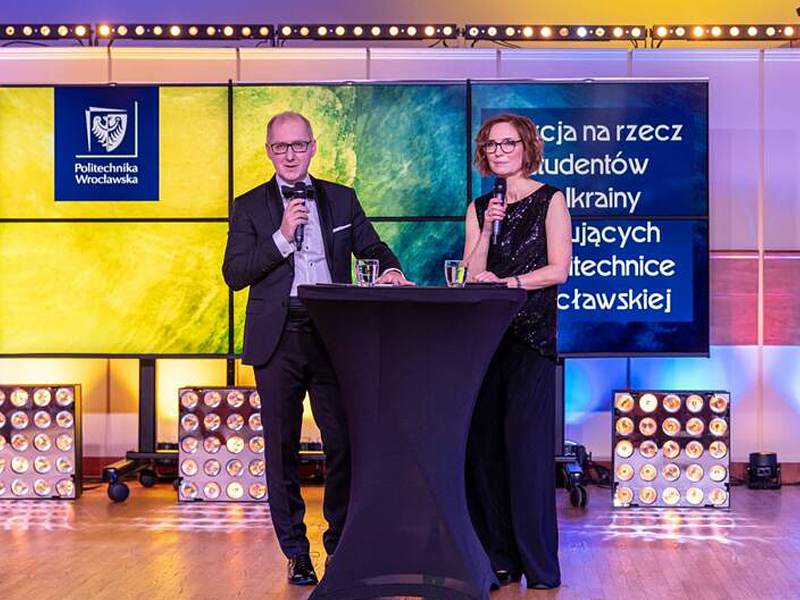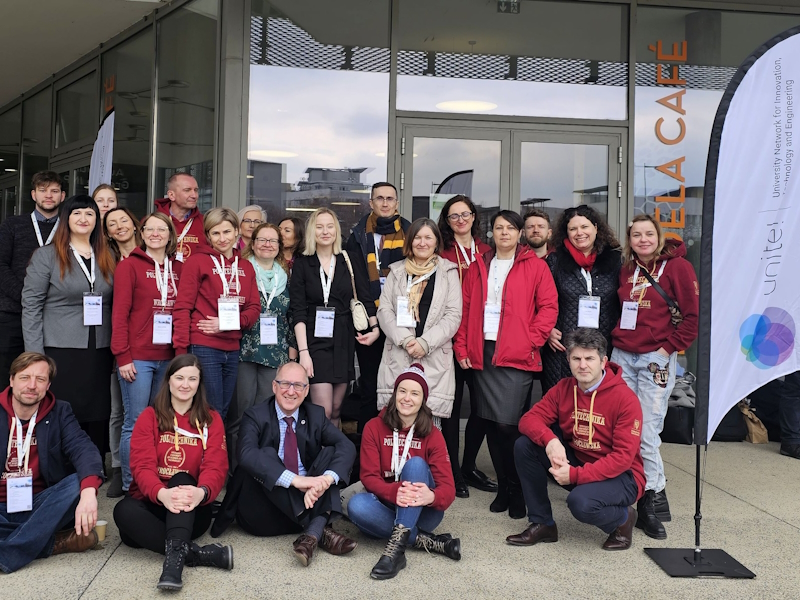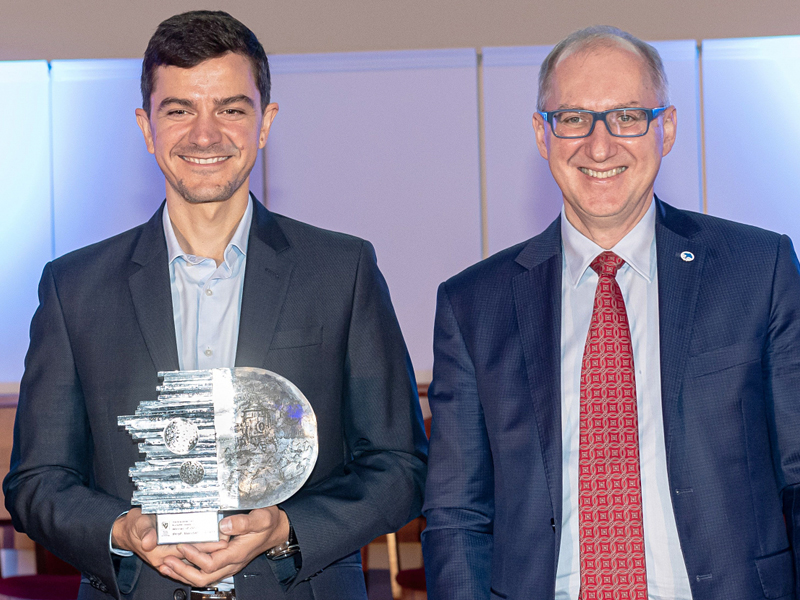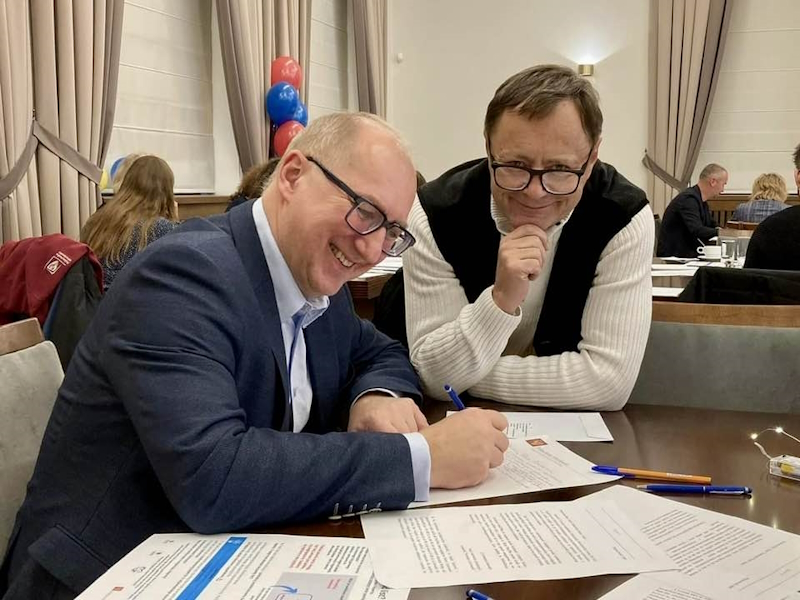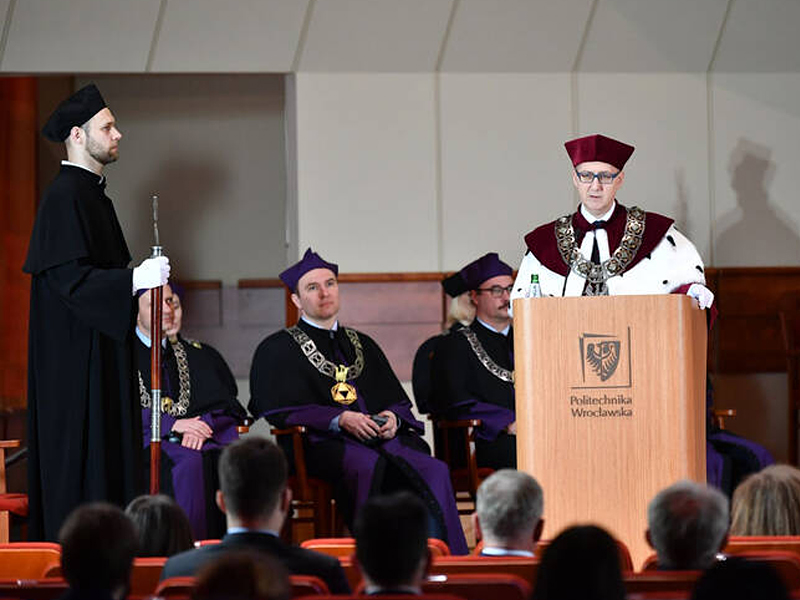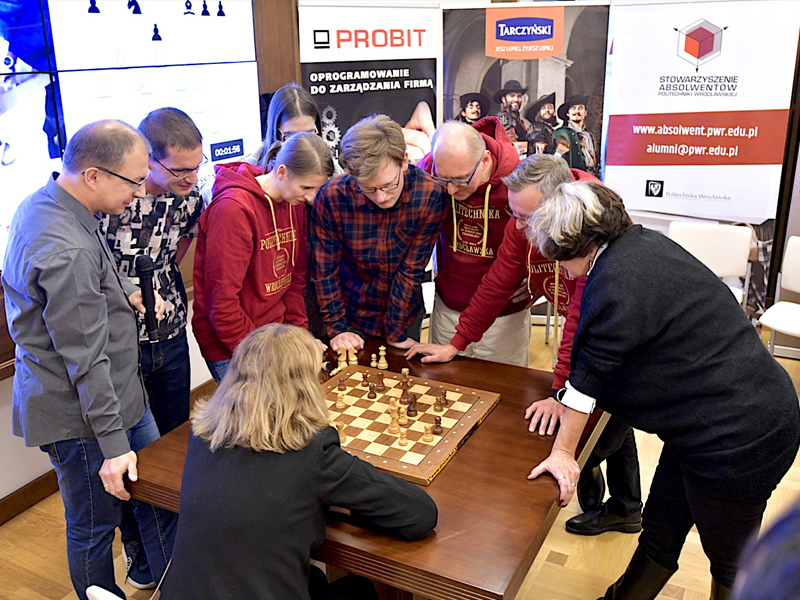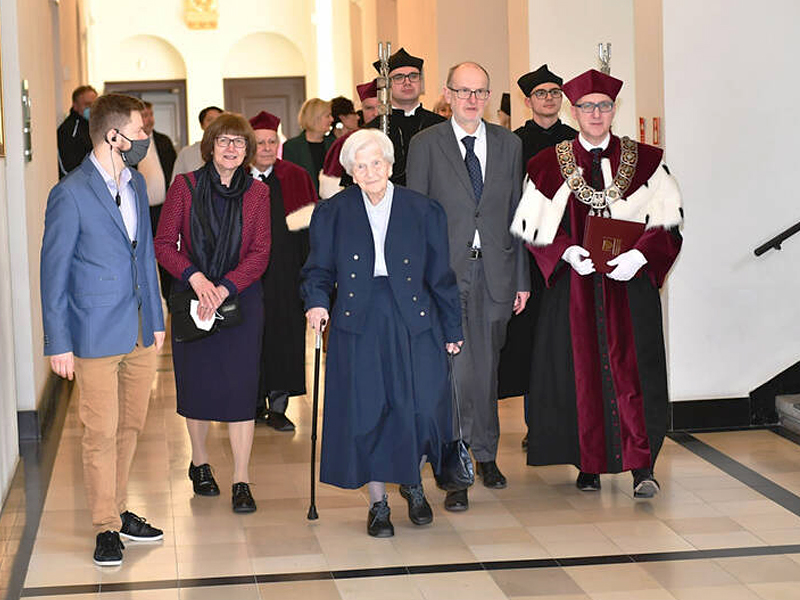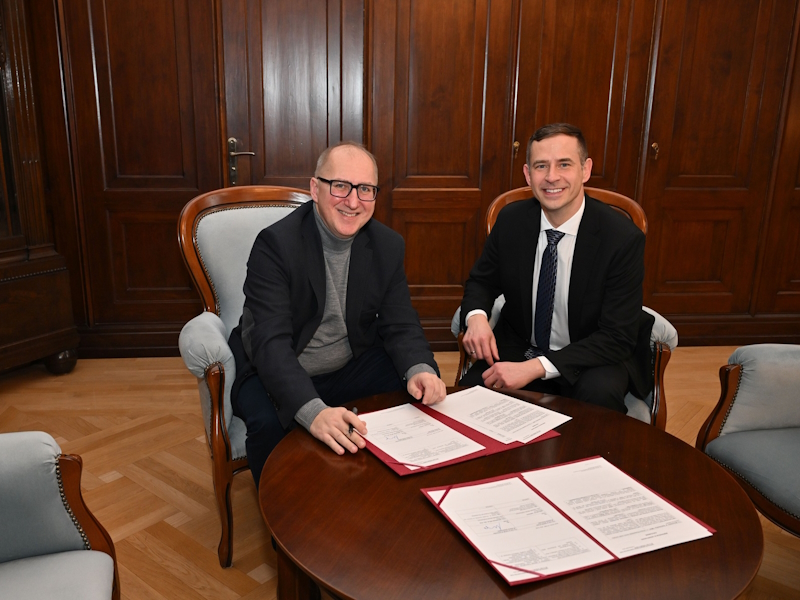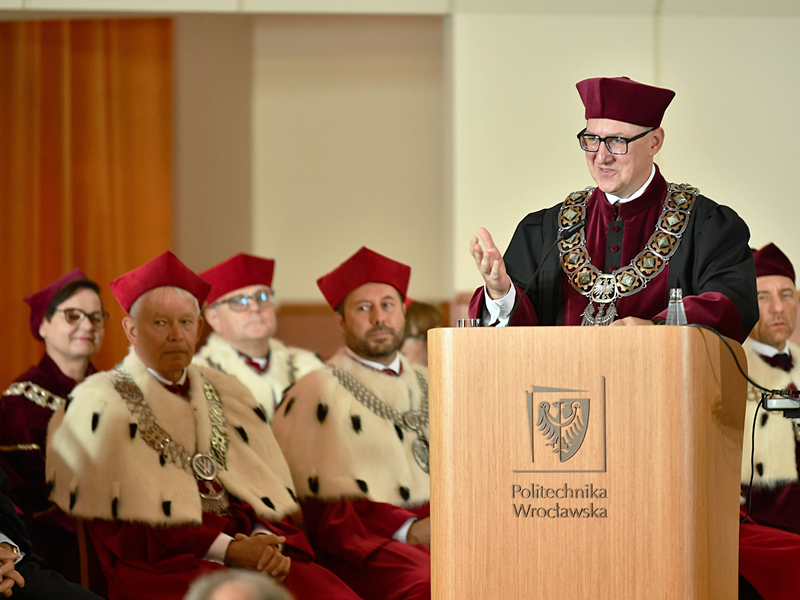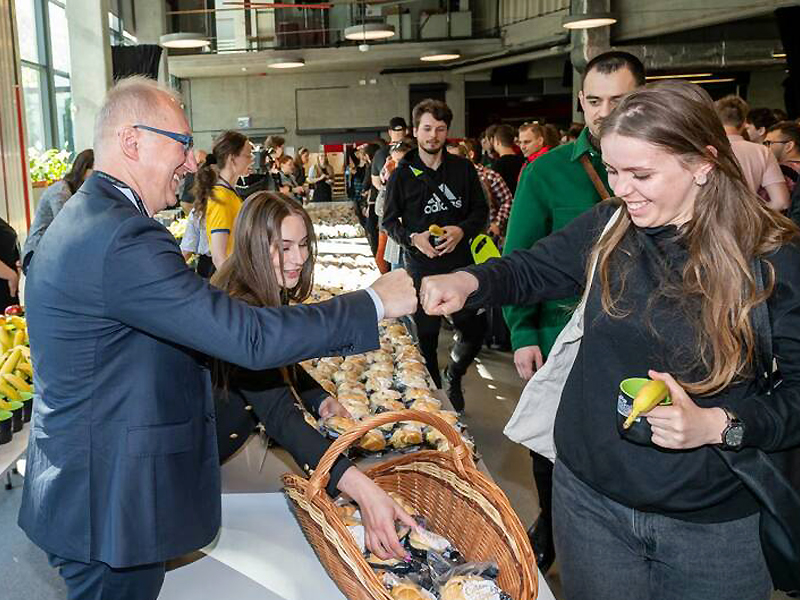Prof. Arkadiusz Wójs, PhD, DSc, Eng, PAS, MAE
Rector of Wrocław University of Science and Technology
Achievements
People + Vision = Effects
The University’s accomplishments in the current term can be attributed to the synergy of two crucial elements: people and vision. Even the most well-crafted development concept would not yield such impressive results without the wholehearted commitment of the community.
People
- Maximizing community involvement in formulating and executing the vision, engaging various stakeholders such as vice-rectors, the University Council, deans, heads of studies, discipline council chairs, plenipotentiaries, the Leaders of Change team, heads of centres, the Student Council, the Council of Doctoral Students, the Senior Rectors Council, authors of Polytechnica Nova competition proposals, and external partners from the business sector, economy, regional government, politics, and other universities.
- Entrusting a wide range of individuals with trust and responsibility, supporting grassroots ideas and initiatives.
- Prioritizing interpersonal relations and well-being, initiating efforts towards achieving a work-life balance.
Vision
- Holistic in its approach — addressing all facets of the University’s activities, profile, internal structure, relations within the institution, and connections with the external environment.
- Community-focused — catering to diverse groups, including on the one hand: students, doctoral students, scientists of various ages, as well as support and administration staff, on the other hand: outstanding and highly engaged individuals, as well as minorities and people with special needs, and finally: people from various departments and disciplines.
- Interconnected — leveraging synergies to reinforce elements, such as supporting self-government activities, student circles, and organizations, fostering academic entrepreneurship and modern didactics, assisting active doctoral students and young supervisors, and enhancing staff and infrastructure in technical sciences with industry collaboration.
- Bold — embracing challenges with calculated risks, such as expansion into medical sciences and envisioning a sizable doctoral school, grounded in the University’s potential and needs.
- Open — fostering collaboration with other universities, the economy, local government, and international partners, influencing the local and global educational, scientific, cultural, and business environment.
- Forward-looking – covering various time scales and addressing both:
- Immediate needs – for example, countering the effects of a failure in the IDUB contest, working under pandemic conditions, the closure of building C-7, the urgent need to implement USOS, preparation for the evaluation of scientific disciplines 2017-2021, preparation for the EUI contest.
- Important matters over the term – for example, strengthening the agency of students and doctoral students, development of interdisciplinary research and education, building a developmental and motivational system for researchers, support for young/new/excellent (meaning: young scientists and educators/new disciplines, research topics, and ideas/existing areas of excellence).
- And issues that reach far into the future – building a large and modern medicine and its integration with engineering, constructing a large and excellent doctoral school, development of interdisciplinary research addressing the challenges of society and the economy, transformation of teaching and its integration with European universities within the Unite! alliance.
- Transparent — communicated through the 2020 rector’s campaign, public speeches, regular meetings, informational texts, and explicitly detailed in the University’s Strategy.
Effects
- Sustaining the University’s operations and maintaining research and educational standards during the pandemic.
- Enhancing the University’s financial standing (among other things, wage increases above inflation).
- Establishing a clear Statute that harmonizes academic tradition with legal requirements.
- Facilitating the reorganization of faculties.
- Executing necessary, urgent, and financially demanding building renovations.
- Ensuring continuity of IT student services (timely implementation of the University Studies Operating System USOS).
- Enlarging the scope of student activity.
- Developing the doctoral school, including transitioning to English.
- Establishing a cohesive system of development and motivation programs for academic teachers.
- Activating young researchers and teaching staff.
- Achieving the best research quality evaluation results in the University’s history.
- Joining the Unite! alliance and fostering numerous partnerships with European polytechnics.
- Crafting a visionary and comprehensive University Strategy, including the identification of priority research areas.
- Establishing or expanding collaborations with strategic business entities.
- Formalizing partnerships with Wrocław’s hospitals and establishing a Faculty of Medicine.
- Creating a complementary system of interdisciplinary research centres.
- Establishing and operating a Centre for Teaching Excellence.
- Fostering the development of an engaged, inclusive, and open community.
- Securing record investment funds for research.
- Planning and initiating various building investments.
- Implementing a support system for students, doctoral students, and staff, including psychological support, mediation, and clear procedures for reporting problems.
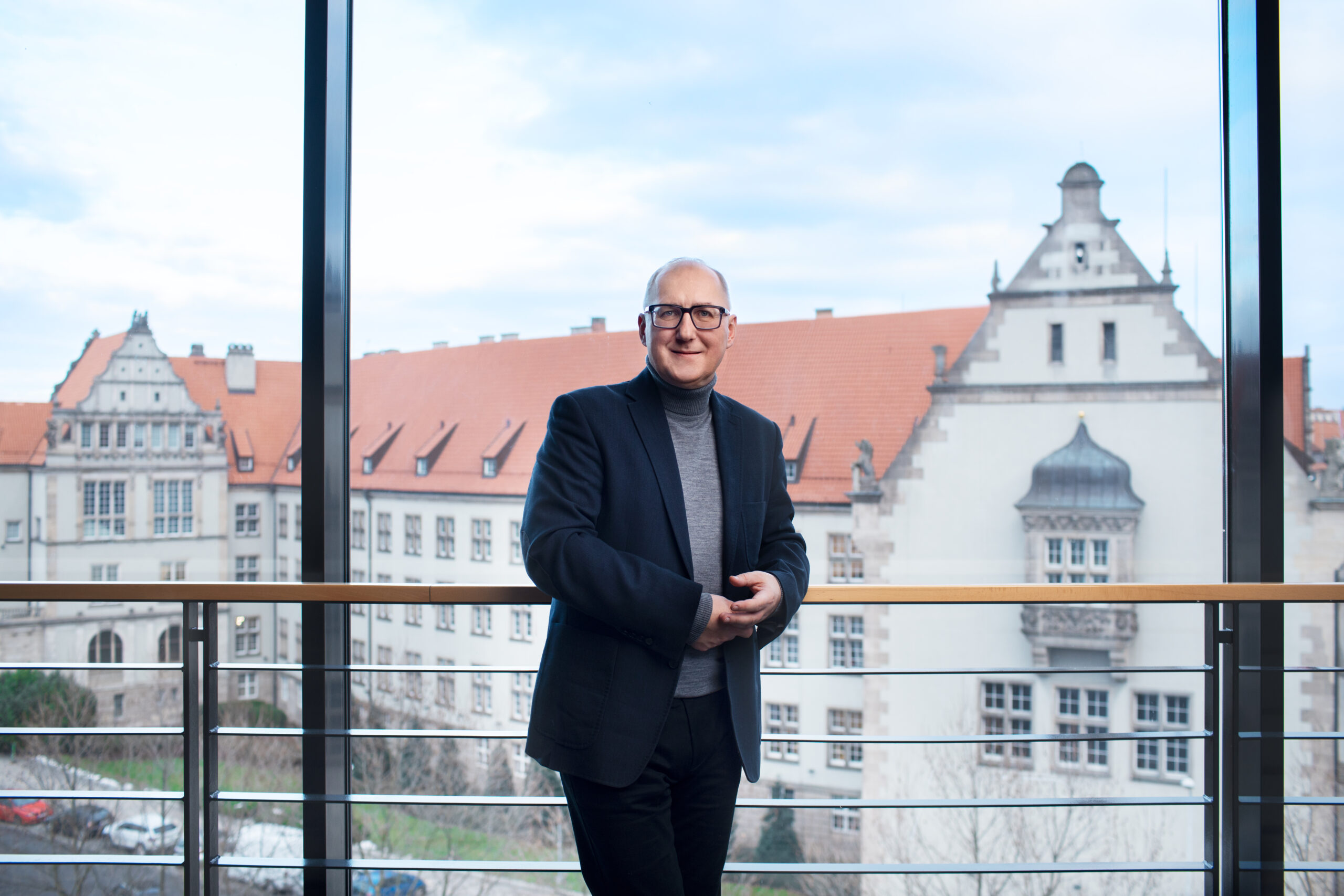
SUMMARY OF THE ACHIEVEMENTS IN THE CURRENT TERM
At the outset of the term, the University confronted several challenges:
- Ramifications of the 2019 Initiative for Excellence in Research Universities (IDUB) competition failure:
- Anticipation of significantly reduced funding compared to leading Polish universities (2% bonus instead of a 10% subsidy, equating to a loss of PLN 40 million/year).
- Exclusion from the annual bond pool for ten research universities.
- Diminished standing when seeking additional development funds.
- Increased student numbers leading to higher teaching salaries and costs.
- Loss of prestige and decline in national and international rankings.
- Concerns about the potential discouragement or exodus of research staff.
- Challenges in recruiting students, doctoral students, and young staff.
- Consequences of failure in the European Universities Initiative (EUI) competition in 2019: European Universities Initiative (EUI) w 2019 roku:
- Loss of prestige.
- Obstacle to student recruitment in the face of competition with Polish members of the EUI network.
- Forced closure and costly renovation of building C-7 due to fire safety non-compliance in 2020:
- High investment costs (original estimate: PLN 68 million).
- Failure to secure external funding.
- Exclusion of a significant area for the duration of the renovation.
- Lack of progress in the implementation of the IT student service system:
- Risk of defaulting on POWER program commitments and fund repayment.
- Prospects of an inefficient IT system and paralyzed student services.
- The need to concentrate IT resources on implementing the new system.
- Potential community discomfort with the rapid pace of system implementation.
- Threatened implementation of the New Opportunities Polytechnic project on accessibility for people with special needs:
- Exorbitant training rates for Wroclaw Tech employees.
- Unrealistic commitments in organizing Wroclaw Tech operations.
- Risk of fund repayment.
During the term, external challenges further deteriorated:
- Successive waves of pandemics:
- Repeated temporary closures of the University.
- Implementation of measures to protect the community’s health.
- Reorganization of the entire University’s operations.
- Urgent implementation of new IT solutions and tools.
- Transition to a remote system of education and examinations.
- Economic consequences, including weakened cooperation and a shortage of IT staff.
- Outbreak of war in Ukraine in February 2022:
- Loss of stability, community fear for the future.
- Support required for the Ukrainian part of the Wroclaw Tech community.
- Transfer of significant funds in the state budget to defense, potentially impacting science and higher education.
- High inflation rate in 2022-2023:
- Significant increase in utility prices, particularly electricity (more than double), posing a severe challenge for polytechnics.
- Decline in the purchasing power of salaries, leading to frustration and the potential exodus of staff.
Despite these adversities, the University has achieved notable milestones during this term, highlighted below.
At the commencement of the current term, the University’s organizational framework required substantial reconstruction. The 2019 statute had disintegrated Wroclaw Tech into departments directly reporting to the rector, sidelining traditional faculties and deans with insignificant roles and eliminating collegial bodies and democratic procedures below the Senate level. Additionally, the implementation of the new structure raised objections.
To rectify this, a two-step process was undertaken to create a new statute. The first step involved an immediate “small” amendment in December 2020, primarily focused on restoring the faculty structure and defining leadership functions. The second step was the “large” amendment in July 2021, conducted calmly with the active participation of the broad community and experts, and it has remained in force with minimal changes to date.
Procedure for the amendment:
- Drafting by a statutory committee representative of the community and experts.
- Soliciting opinions from numerous bodies beyond the legal requirements.
- Presentation and discussion at meetings involving the community.
Content of the Strategy 2023-2030:
- Compact and clear form, ensuring transparency in the University’s functioning.
- Restoration of the University’s departmental structure with strengthened faculty councils.
- Flexible internal structure of faculties, including chairs and institutes.
- Reconfiguration of bodies such as the Senate, University Council, discipline councils, and electoral college.
- Adherence to democratic principles in electing individuals to leadership positions and collegiate bodies.
- Definition of leadership functions to reinstate the prestige of the college of deans.
- Prohibition of combining leadership functions with other roles.
- Clarification of the relationship between faculties and councils of scientific disciplines.
- Simplification of the structure of academic staff positions, with the addition of visiting positions.
At the outset of the term, the University lacked an updated strategy document, relying instead on a development plan from seven years prior. While the 2019 IDUB competition identified priority research areas, they required revision.
The need for a comprehensive strategy was evident, serving to define a mutually accepted mission, vision, and values, transparently outlining the University’s development directions, priorities, and goals.
A robust strategy serves as a community-building element, a commitment to development, and a basis for informed decisions. It facilitates positioning against other universities and fosters relationships with the environment.
Given that management by strategy is not a prevalent practice in Polish universities, crafting a document to support Wroclaw Tech’s ambitious development plans became a crucial challenge of the current term.
The Strategy 2023-2030 was eventually adopted in 2023, following the evaluation of scientific research quality, acceptance into the Unite! alliance with funding from the European Commission, and Senate approval for the establishment of the Faculty of Medicine’s medical faculty.
Preparation of the Strategy 2023-2030:
- Collaboratively created by various individuals and bodies, including the Rector’s College, the Strategy Planning and Implementation Committee, Leaders of Change, members of the University Council, external experts, deans, chairs of discipline councils, heads of studies and departments, and volunteers.
- Informed by community opinion surveys and an analysis of the University’s state across personnel, infrastructure, research in various scientific disciplines, and education in diverse fields of study.
- Considered the latest internal and environmental changes, such as research evaluations, Unite! alliance membership, partnerships with universities and businesses, the decision to build an Intel factory near Wroclaw, the establishment of the discipline of materials engineering, and Senate approval for the development of medical sciences.
- Subject to opinions from numerous bodies, including those not legally mandated (Senior Rectors’ Council, trade unions, Student Council, Doctoral Students’ Council), and extensively discussed at meetings.
- Patron: Stanisław Lem, doctor honoris causa at Wroclaw Tech, serving as inspiration, motto, and monument.
Content of the Strategy 2023-2030:
- New vision, mission, and values of the University.
- A new profile for the University, emphasizing synergy across four areas of sciences: technical, basic, social/humanities, and life/health sciences, mirroring the largest technical universities globally. This includes a particular focus on expanding into medicine and fostering interdisciplinary research.
- New areas, goals, and strategic initiatives.
- New priorities: community development, state-of-the-art training of specialists and leaders, support for student and doctoral activity, initiation of groundbreaking research in priority areas, and cooperation within the Unite! alliance and with the economy.
- In the realm of research and innovation, definition of new priority research areas, characterized as large interdisciplinary domains where the University possesses potential and should assume a leading role, demonstrating responsibility for the development of the local and global knowledge economy and a modern and informed society.
- The evaluation of scientific activity posed a significant challenge for the University, particularly following the 2019 IDUB competition where Wroclaw Tech ranked 17th in the country. The prognosis before the evaluation was unfavorable, with potential consequences for academic credentials in certain disciplines, doctoral programs, research funding, reputation, and future competition eligibility.
- Crucial role of appointing an outstanding Wroclaw Tech scientist as the Rector’s Plenipotentiary and of his unwavering dedication. The Plenipotentiary assembled a team of specialists responsible for various evaluation criteria, implemented an IT system to support data preparation and simulations, and played a key role in motivating researchers, especially in disciplines where end-of-period performance determined scores. Simulations guided decisions on whether to subject new disciplines to evaluation based on hard data.
- Results: 4 A+ categories, 9 A categories; in terms of the number of A+s, this secured a shared 4th-6th place (after UW, PG, UJ, tied with UAM and UMK). In the average category among universities with at least 5 disciplines, this positioned Wroclaw Tech in 2nd place in the country, a substantial improvement from the 2017 evaluation (1 faculty with A+ category, 11 A, 1 B).
- All evaluated disciplines were granted doctoral and postdoctoral rights, including a new discipline: materials engineering.
- The university achieved this outcome without resorting to the common practice of transferring researchers to full-time teaching positions (approximately 75% of academic staff in Wroclaw Tech departments were evaluated) or engaging in fictitious hiring from other centres.
- The excellent result resulted from a surge in publication activity at the end of the evaluation period. Credit is due to various stakeholders, including the Vice-Chancellor and the Plenipotentiary for effective communication, deans, heads of departments, chairs of discipline councils for motivation and support, and the entire academic staff, along with indirect contributions from the support system and administration. Incentive programs likely played a role.
- Given the current legal context and known weaknesses of the evaluation system, compelling arguments presented in appeals against originally awarded categories were crucial. For instance, disciplines initially rated A despite having outstanding national scientific potential, conducting European-level research, and receiving A+ ratings from one of the two experts involved deans and discipline council chairpersons in preparing appeals.
These programs collectively advance research excellence, acknowledge achievements, support young researchers, and enhance the overall academic culture at Wroclaw Tech.
Development programs, facilitated through workshops, seminars, and access to training materials, aim to level the playing field and cultivate the University’s staff. Incentive programs, designed to encourage specific activities such as publishing in prestigious journals or applying for grants, complement the overall strategy. Award programs play a vital role in recognizing and showcasing achievements and exceptional commitment. Most programs incorporate various functions, with some additionally establishing representative opinion-making bodies like young scientists, young supervisors, group leaders, and distinguished professors.
Decisions regarding nominations, prizes, awards, and elections to academies are typically made collegially by committees and chapters, such as the Rector’s Awards Committee, which comprises chairpersons of discipline councils designated through a democratic appointment procedure.
- Primus: Primus-1 incentivizes high-scoring publications with financial rewards, motivating employees and doctoral students to publish in top-tier journals. The program covers publications for a minimum of 200 points, with special bonuses for articles in Science or Nature. The annual cost for both Primus-1 and Primus-2 activities is approximately PLN 2.5 million.
- Secundus: Secundus rewards the top 100 young Wroclaw Tech scientists based on their publication output, providing financial support and highlighting their achievements. The annual cost is around PLN 600,000.
- Tertius: Tertius supports academic teachers in implementing research projects by reducing teaching salaries. The program aims to motivate employees to obtain grants and effectively distribute research and teaching responsibilities among faculty members.
- Quartus: Quartus rewards authors of inventions with financial bonuses for patent applications, emphasizing international patents and those aligned with priority research areas. The annual cost is approximately PLN 1 million.
- Quintus: Quintus recognizes and rewards doctoral students and university teachers for their commitment to student education. Winners are selected by the Student Government, fostering student involvement in the evaluation process. The pilot edition’s cost is PLN 200,000.
- Academia Iuvenum: Academia Iuvenum supports outstanding young scientists with a dedicated training program, salary supplement, and wide-ranging support. The program aims to make career development more attractive and strengthen the voice of young staff. The annual cost is about PLN 3.2 million.
- Academia Professorum Iuniorum: Academia Professorum Iuniorum aids young independent academics in building research teams or exploring new topics. It offers a dedicated training program, an internal grant, and support for the transition to leadership roles. The annual cost is about PLN 2.7 million.
- Professor Magnus: Professor Magnus honors outstanding professors, granting favorable conditions for creative work regardless of age. The status is awarded to six professors annually for three years. The program aims to build academic excellence and recognize individuals contributing to the University’s greatness.
- Invitatio: Invitatio assists departments in hiring independent researchers by providing additional funds for salary reimbursement and initial expenses. The program is in a pilot phase, and its development towards accommodating extraordinary compensation and real research infrastructure costs necessitates fundraising and appropriate arrangements.
- Tesla Prize: In 2023, Wroclaw Tech established the Nikola Tesla Prize for outstanding scientific or engineering achievements largely created at the university. The prize, awarded annually by external experts, aims to identify and promote the university’s greatest contributions to global science and technology. It is entirely externally funded.
To harmonize the restructuring of the faculty structure at Wroclaw Tech, the reorganization of specific departments according to scientific disciplines, and the emphasis on interdisciplinarity as outlined in the Strategy focusing on addressing key challenges in modern society and the economy, 10 research centres were established. These centres serve as platforms to facilitate collaboration and synergies among disciplines.
The 10 research centres are as follows:
- Centre for Sustainable Development and Climate Protection,
- Centre for Mobile Robotics,
- Ryll-Nardzewski Centre,
- Health Tech Synergy Hub,
- Centre for Defence Innovation and Technologies,
- Urban Innovation Centre: Architecture, Engineering, Technology, Mobility,
- Centre for Materials Engineering and Plastic Processesing,
- Centre for Trusted Information and Telecommunications Systems,
- Centre for Micro- and Nanoelectronics, Micro- and Nanosystems, and Micro- and Nanoengineering,
- Centre for Advanced Raw Materials and Energy Technologies.
These centres are tasked with conducting research, development, implementation, educational, service, information, and promotional activities. Their overarching goal is to integrate communities within Wroclaw Tech and inspire collaboration with other scientific institutions, the business community, administration, and non-governmental organizations.
The establishment of these research centres has also led to the acquisition of significant investment funds for infrastructure. This infusion of resources is expected to result in a qualitative enhancement of the University’s research potential in the years to come.
- Annually, Wroclaw Tech consistently ranks among the top 10 universities in the Perspektywy Foundation’s ranking. While it slipped from 6th-7th place to 8th between 2020 and 2023, the University’s score has been steadily rising since the initial decline in 2020. In the latest ranking, it surpassed the pre-IDUB competition value for the first time: 2019 – 73.2 points, 2020 – 65.6 points, 2021 – 72.6 points, 2022 – 72.6 points, 2023 – 74.2 points.
- The continuous improvement in the university’s position in the Perspektywy ranking is noteworthy, considering the competition with research universities, the disparity in research funds (with an 8% subsidy difference), and a higher number of students resulting in a higher teaching load. Despite these challenges, if the upward trend from 2020 to 2023 persists, Wroclaw Tech is projected to regain 1st place among polytechnics and secure 3rd place overall by 2027, just after the conclusion of the current IDUB cycle.
- Wroclaw Tech has consistently approached the TOP 1000 in the “Shanghai” ranking (ARWU), with improvements in the PUB (indexed articles) and PCP (scientific efficiency per person) criteria. The absence of scores in the Alumni, Award, and HiCi criteria has been compensated by a significant impact in N&S (publications in Nature or Science). The return to the TOP 1000 in 2024 is anticipated following the publication of a paper in Nature in 2023 (“Bright and stable perovskite light-emitting diodes in the near-infrared range”).
- The strategic approach for Wroclaw Tech to ascend in the Shanghai ranking involves sustained efforts to increase indexed publications, particularly in Nature and Science, and attracting Highly Cited Researchers. Initiatives such as incentive and development programs, substantial investments in research infrastructure, development in medical sciences, collaboration with the Unite! alliance, and the establishment of a doctoral school are expected to yield significant and enduring results in the coming years.
- Notably, Wroclaw Tech is currently executing its first-ever ERC grant, focusing on “Chip-based room-temperature terahertz frequency comb spectrometers” during the current term.
- The University has welcomed three new members to Academia Europaea, two members to PAN, and one member to AMU PAN, contributing to its growing academic prestige. Academia Europaea, 2 członków PAN i 1 członka AMU PAN.
- Presently, 48 Wroclaw Tech scientists are listed among the top 2% of the world’s most cited researchers, positioning Wroclaw University of Science and Technology as the fourth in Poland (behind AGH, UW, and PW; ahead of PG and UJ).
- The commitment to modernize and enhance the attractiveness of the education system, particularly for engineers, was a pivotal goal at the commencement of the term. This commitment was underscored by Wroclaw Tech’s participation in the Unite! alliance. The alliance is actively collaborating to develop a student-cantered interdisciplinary holistic education model, which will eventually be integrated into the Unite! large virtual campus. This virtual campus encompasses 25,000 academics from diverse disciplines and fields of study, along with 200,000 students and postgraduates.
- The Centre for Teaching Excellence (CDD) was established to facilitate the analysis, development, and implementation of the education transformation model. Initially conceived as a think tank during the 2020 election program, CDD has evolved into an organizational unit with its own management, infrastructure, and budget. CDD’s core responsibilities include conducting research and analysis on education, enhancing the teaching competence of academic teachers and doctoral students, developing and implementing modern educational methods, supporting the adoption of innovative solutions and tools (such as e-learning), and creating a system to motivate teaching staff. CDD is actively involved in training for trainers through initiatives like the University’s Teaching Excellence project and the Teaching Excellence seminar.
- In response to the new Strategy and societal demand, Wroclaw Tech has introduced 28 new majors during the current term, including 12 at the undergraduate level, 15 at the graduate level, and a stand-alone medical major at the master’s level. Notably, seven of these majors are offered in English, and four are joint majors (Advanced Solid Mechanics, Sustainable Biomass and Bioproducts Engineering, Chemical Nano-Engineering, Bioeconomy). Additionally, several existing majors have undergone curriculum revisions.
- The general academic majors offered at the Jelenia Góra, Legnica, and Wałbrzych branches have been enhanced to make them more attractive.
- All ten majors (across seven faculties) evaluated by the Polish Accreditation Committee (PKA) during the current term received positive evaluations.
- In terms of accreditations, 12 majors received international accreditation, and three majors received accreditation from the Committee for Accreditation of Universities of Technology (KAUT) in the current term. An additional six majors have applied for KAUT accreditation.
- Construction and Chemical and Process Engineering consistently secured the 1st position in the country each year (2021, 2022, 2023) in the Perspektywy Foundation’s ranking of majors.
- The University has established 18 new teaching laboratories across seven existing faculties, and the entire teaching infrastructure for the Faculty of Medicine has been developed.
- Wroclaw Tech’s Academic High School (ALO) is currently ranked second in Lower Silesia in the Perspektywy Ranking, and in 2023, it achieved a top-10 ranking in the country for the first time. Following the introduction of medical studies, ALO has added a class with a profile of mathematics+chemistry+biology.
- Through patronage agreements, Wroclaw Tech has partnered with several high schools, providing didactic support to entire schools or selected classes, including agreements with LOs No. 3, 7, and 14 in Wrocław. The University actively contributes to secondary school education through initiatives such as the Academy of Young Explorers, the Talent Studio, participation in the organization of the Lower Silesian Science Festival, and other efforts to popularize science and technology among children and young people.
- Wroclaw Tech is actively engaged in regional initiatives, including participation in the project to establish an Industry Skills Centre in Walbrzych, scientific patronage of the Witelon Centre for Science, Culture, and Education in Legnica, and support for secondary schools in the region.
- The Quintus program, as part of the incentive system for educators, introduces a pro-quality initiative wherein students reward employees and doctoral students.
- A standard agreement with the Student Government on staffing functions and positions directly impacting students was implemented. This includes positions such as the vice-rector for student affairs, in accordance with the law, as well as the vice-rector for education and heads of departments supporting student activities.
- The SKS building has been equipped with fire protection systems, allowing for the hosting of large events.
- The sale of beer at SKS has been permitted, and soon there will be special grades with the Wroclaw Tech brand.
- Renovations and adaptations were completed in student residences T-2, T-3, T-4, T-6, T-17, T-19, and T-22 in Wrocław, as well as T-23 in Legnica, T-24 in Jelenia Góra, and T-25 in Wałbrzych.
- The first post-pandemic major event, #WrocławRazem Juvenalia 2023, was successfully organized. Arrangements have been made and funds secured for an even larger joint Juvenalia event in 2024.
- The establishment of the Student Activity Support Department.
- A significant increase in funding for student activities.
- The expansion of the number of Strategic Study Circles.
- Introduction of an incentive system for evaluating teaching activities in student surveys.
- The appointment of the Rector’s Plenipotentiary for the investment of the Science Circles campus.
- Planning and initiation of the construction of probably the largest Student Innovation Campus (KIS) in the country at Gdańska and Sopocka Streets, exclusively for the use of student circles and organizations. A concept for land development was created, and funds for this purpose were secured.
- Improvement of the system supporting scientific circles in obtaining funds in national and international competitions.
- Development of cooperation with public entities (Wrocław, Legnica, Wałbrzych, UMWD, economic zones) to obtain or facilitate support for student activities.
- Establishment and development of cooperation between scientific circles and business partners, facilitated by the Centre for Innovation and Business.
- Fostering relations between scientific circles and other universities, including cooperation between circles with similar profiles (e.g., PWr in Space with a circle from Poznań and PWR Racing Team with a circle from Białystok).
- Transitioned to combined self-funding of canteens and dormitories.
- The creation of the Wroclaw University of Science and Technology Statute and Strategy exemplifies a commitment to building the University’s community. The process involved an open and representative composition of committees, broad consultation, and agreement, demonstrating transparency in communication.
- Despite the trend in some universities to adopt management models from the corporate world, Wroclaw Tech has maintained a democratic and traditionally academic approach both in its Statute’s provisions and in practice. Democratic procedures for electing deans and chairs of discipline councils ensure that these positions have community support and strong autonomy from the rector.
- Transparency is a guiding principle at every level of the University’s management. This includes the reinstatement of the strong position of the College of Rectors and Deans, deans’ access to full financial information, their participation in key decisions at the University level, a transparent algorithm for subsidy distribution, and clear rules for hiring, promotion, and employment after retirement.
- Regular meetings between the rector and faculty leaders and communities, as well as meetings with the entire University community on important issues, contribute to community engagement and participation in decision-making.
- Plenipotentiaries of the Rector have been appointed for persons with disabilities, anti-discrimination, and anti-corruption, reflecting a commitment to address these important aspects within the University.
- The establishment of the University’s Equality Policy Team, the Rector’s Anti-Discrimination Committee, and an Anti-Mobbing Committee further demonstrate the University’s commitment to fostering an inclusive and fair environment.
- Wroclaw Tech stands as the second university in the country, after UW, to introduce an Equality Plan including a Gender Equality Plan. The University conducts numerous equality and anti-discrimination trainings.
- Research on discrimination and work-life balance has been conducted, and an action plan is being developed to address these issues.
- Accessibility Leaders have been appointed to support people with special needs in their units and promote the idea of accessibility after appropriate training.
- The University supports minorities and people with special needs through projects like the Accessible University, the use of feminatives, and IT systems overlays supporting transgender individuals.
- Collaboration with foundations and NGOs, including the Your New Possibilities Association, contributes to community building.
- The introduction of new development and incentive programs like Academia Iuvenum and Academia Professorum Iuniorum strengthens ties between departments and disciplines.
- Joint events and celebrations contribute to fostering a sense of unity within the academic community.
- Representations of young scientists and young independent researchers have been established, giving them the right to consult and articulate opinions, thereby fostering inclusivity.
- The composition of the Honorary Dignities Chapter has been expanded, including representatives from various groups, to decide on awarding the University’s most important dignities.
- The Rector’s Charity Ball, organized even during the pandemic, has raised significant funds for scholarships, breaking records each year.
- An academic teacher with a doctorate is now employed at least as an assistant professor, and one with a habilitation as a university professor, linking position promotion and salary increase to external evaluation.
- In the subsidy distribution algorithm, academics declaring non-evaluated disciplines were assigned a B+ category, preventing financial discrimination and promoting the development of new disciplines.
- Rules for the distribution of funds for salary increases were developed in collaboration with trade unions, ensuring solidarity distribution between academic and non-teaching staff.
- The Polytechnica Nova competition was announced with the following objectives: to attract innovative ideas for the development of the University, to involve community members in the evaluation of proposed solutions and their implementation, to integrate and strengthen the community’s agility, and to build a sense of belonging and shared responsibility for the University.
- The first edition of the competition took place in 2022 and was a great success thanks to the large number of interesting ideas submitted, the involvement of the competition committee and the entire community in their evaluation, and the commitment of the winners to implement their ideas.
- Three winning projects in each category (Let’s GO – an interdisciplinary teaching laboratory using oculographs; ATOM Interdisciplinary Open Central Laboratory – for the study of phenomena at the atomic level; Development of bicycle infrastructure at PWr – a bicycle center with service, locker rooms and sanitary facilities, as well as bicycle parking lots) and one honorable mention project (Restoration of the historic DKF Politechnika cinema hall) were accepted for implementation first.
- External funds were obtained for the largest project (more than PLN 20 million for the purchase of an 800 MHz NMR spectroscope with equipment for the ATOM central laboratory).
- Both ongoing projects in the “social responsibility of the University” category (bicycle infrastructure and DKF hall) are addressed to the entire PWr community and will significantly contribute to the development of the community; while ATOM and Let’s GO are innovative open laboratories, available to employees, doctoral students and students of the entire University.
- In the second edition of the competition in 2024, new categories have been defined, in line with the University’s Strategy (community, education, research), and financial prizes have been planned for the winners.
- Three winning projects were directed to immediate implementation: “Artificial Intelligence Application Center”, “Student Innovation Center” and “sPokójPWr”, while at least three awarded projects: “WrocTech PostDoc,” “Center for Process Robotics,” and “TASK” will be implemented as financially feasible.
- Between 2020 and 2023, the total number of employees increased and, at the same time, the ratio of teachers to non-teachers improved, and the gender disparity decreased:
- The number of employees increased from 4,786 to 4,993 (by 4%), including academic teachers from 2,162 to 2,295 (by 6%) and non-teachers from 2,624 to 2,698 (by 3%).
- The share of academic teachers among all employees increased from 45% to 46%.
- The number of research and teaching and research positions increased from 1,555 to 1,663 (by 7%), including the number of assistant professors by 17% and the number of university professors by 10% (the number of full-time professors remained unchanged).
- The share of women employed in all research and teaching and research positions increased from 23% to 32%, including the number of full-time assistant professors from 25% to 35%, the number of full-time university professors from 20% to 28%, and the number of full-time professors almost doubled from 12% to 20%.
- The number of women in individual research and teaching and research positions increased as follows: from 23 to 40 (+74%) female professors, from 69 to 108 (+56%) female university professors, and from 202 to 334 (+65%) female assistant professors.
- Responding to the request of employees from various departments, the restructuring of faculties at Wroclaw Tech resulted in the formation of specialized faculties. The Faculty of Computer Science and Telecommunications (W4n) now caters to computer science and telecommunications, the Faculty of Management (W8n) houses social sciences and humanities along with computer science from W8, and the Faculty of Electronics, Photonics and Microsystems (W12n) brings together electronics and photonics. The Faculty of Fundamental Problems of Technology (W11) retains its name.
- This restructuring has effectively unified related disciplines within each faculty, streamlining recruitment, education, and research. The reorganization highlights the University’s consolidated potential in key technical disciplines of the polytechnic.
- The Faculty of Computer Science and Telecommunications (WIT) stands out as the largest department at Wroclaw Tech and the largest computer science department in the country. With over 420 staff, including more than 300 academic teachers and 75 independent researchers, WIT plays a significant role in educating over 4,500 students. The department actively collaborates with the economic environment and engages in interdisciplinary research with various departments within Wroclaw Tech.
- The Faculty of Management (WZ) may be smaller in size but holds great potential for research and education. With 142 employees, including 114 academic teachers and 30 independent researchers, the faculty educates over 1,100 students. Its scope extends beyond management and quality sciences, encompassing social sciences and humanities disciplines, fostering interdisciplinary research and collaboration with other faculties.
- The Faculty of Electronics, Photonics and Microsystems (WEFiM) is a substantial department with 253 employees, including 174 academic staff and 40 independent researchers. Educating more than 2,000 students, WEFiM covers various fields and contributes to applied research for the economy. The department actively engages in interdisciplinary research in collaboration with other departments at the University.
- The idea of expanding Wroclaw Tech into new fields and disciplines, particularly in life and health sciences, emerged during the 2020 election campaign. Efforts were made to strengthen cooperation with other Wroclaw universities in these areas. The independent development of medical sciences at the University was formalized in the University’s Strategy adopted in May 2023.
- Successful examples of technical universities expanding into medical sciences, such as Imperial College London, KTH Stockholm, TU Dresden, and TU Munich, inspired the decision to venture into medical education.
- Preparations for medical research and education involved approximately a hundred people, including employees from various departments and administrative divisions of Wroclaw Tech, external experts, and Wroclaw professors of medicine. Elected vice-rectors and a dedicated Rector’s Plenipotentiary were actively involved in managing the process.
- The success of establishing medical education required convincing support from various authorities, including the Marshal of the province, the Minister of Education and Science, the Minister of Health, the relevant parliamentary committee, and the Lower Silesian Chamber of Physicians.
- The challenge of preparing the medical faculty’s educational program was met through collaboration with experienced doctors. The program not only met formal requirements but also addressed weaknesses identified in other Polish medical universities, leveraging the unique potential of Wroclaw Tech’s staff and infrastructure.
- A comprehensive application for approval to begin medical education, exceeding 4,000 pages, was submitted to the Ministry of Education in January 2023. The application covered recruitment principles, curriculum, declarations of qualified teaching staff, and detailed information on infrastructure.
- Agreements with the Marshal of the province and directors of major Wroclaw hospitals, except USK, were secured in December 2022 to regulate access to medical personnel, patients, and clinical infrastructure.
- The start-up of the Faculty of Medicine incurred serious costs, but external funds were obtained for the adaptation of the C-20 building and the establishment of the Medical Simulation Centre and other specialized medical laboratories.
- The Faculty of Medicine (WMED) was officially established on September 1, 2023.
- Faculty recruitment for WMED was successful, with 69 academics, including 16 professors and 19 college professors. The average age of a professor at WMED is the lowest among all faculties at Wroclaw Tech.
- Six departments and constituent clinics at partner hospitals were established at WMED.
- The Medical Sciences Discipline Council, consisting of 26 members, including 11 professors, is now in place at Wroclaw Tech.
- The first recruitment of students to the medical faculty was successful, with Wroclaw Tech receiving approval for 60 places, and a high number of candidates per place.
- Comments on PKA’s opinion on the medical faculty:
- In January 2023, Wroclaw Tech submitted an application to the Ministry of Education (ME) for approval to establish a unified master’s degree program with an all-academic profile in the medical faculty.
- After formal and substantive analysis, ME returned the application with comments.
- In February 2023, the Minister of Education and Science visited the teaching infrastructure for the medical faculty and heard Wroclaw Tech’s plans for preparing for the academic year and the development of medicine.
- Also in February 2023, Wroclaw Tech submitted a revised application to ME.
- ME accepted Wroclaw Tech’s application and sent it to the Polish Accreditation Committee (PKA) and the Ministry of Health (MZ) for their opinions.
- In April 2023, the MZ sent Wroclaw Tech a request for additional clarification on 5 issues concerning: (1) the Medical Simulation Center; (2) coordination of classes in hospitals; (3) the list of teachers and teaching activities; (4) interdisciplinarity of research; (5) teaching teams for selected subjects.
- In April 2023, Wroclaw Tech sent extensive explanations (28 pages) to the MZ.
- In May 2023, PKA returned Wroclaw Tech’s application with reservations and a negative opinion; PKA’s reservations concerned: (1) compliance with the University’s strategy; (2) educational content of disciplines other than medical sciences; (3) consultation with external stakeholders; (4) justification for the need to launch the course; (5) the way in which some courses are delivered – especially anatomy; (6) determination of the number of student work hours; (7) conditions for launching elective courses; (8) recruitment conditions; (9) verification of learning outcomes; (10) staff competence; (11) infrastructure – especially the dissecting room; (12) library resources.
- Also in May 2023, Wroclaw Tech sent an extensive (160-page) response to PKA’s objections to the ME and PKA, including: information on Wroclaw Tech’s new Strategy (objection 1) and the implementation of revisions (4, 6, 8, 12), supplementary information and clarification of misunderstandings (2, 3, 5, 7, 9, 10, 11), and a polemic against the requirement to have its own prosectorium (11).
- In June 2023, the MZ issued a positive opinion.
- Also in June 2023, on the basis of Wroclaw Tech’s explanations and the MZ’s positive opinion, without waiting for the PKA’s final opinion, the ME authorized Wroclaw Tech’s medical education.
- Already after receiving ME’s approval, Wroclaw Tech carried out a number of activities (including investment) in accordance with PKA’s recommendations.
- PKA’s main objections concerned the lack of a dedicated didactic prosectorium for teaching normal anatomy; in response, Wroclaw Tech has taken the following steps: (i) WMED now has access to dissection rooms at partner hospitals, as well as its own Living Tissue Dissection Laboratory (the so-called wet lab) and a virtual dissection room; (ii) starting from the second semester (i.e., May 2024), when dissection classes appear in the curriculum, WMED will already have not only its own anatomical laboratory with formal status of a didactic prosectorium, but also (on the basis of agreements) dedicated didactic prosectoriums in two partner hospitals (4th WSK and WSS Gromkowski), where, among other things, plastinated human preparations – this will provide conditions for the education of normal anatomy equivalent to those provided at Polish medical universities (and European reference universities); (iii) eventually (from 2028) the WMED Anatomicum Collegium will be located in the new HTSH building.
- The University is currently awaiting accreditation of the medical faculty; a self-assessment report was sent to PKA in March, a visit by the assessment team is expected in April, and an assessment of the faculty (according to information from the Minister of Science) is expected by the end of May.
- Upon accreditation, Wroclaw Tech will apply to the Minister of Health to increase the recruitment limit to 72 places in the 2024/2025 academic year.
- In accordance with the regulations (and information from the Minister of Science in January 2024), the University expects further PKA visits after the 3rd and 6th years of education; Wroclaw Tech will also apply for admission to the Conference of Rectors of Academic Medical Universities (KRAUM) and will begin to be subject to KRAUM’s internal educational quality control system.
- Wroclaw Tech plans to provide medical education at a European level, implementing consistent measures to address concerns and improve the quality of medical education.
- Unite! – Following the failure of the previous term’s proposal to create a new alliance within the network of European universities, the University initiated negotiations in 2021 to join existing alliances. After discussions with the ATHENA and EuroTeQ alliances, in 2022, we, along with TU Graz, joined the Unite! alliance. This alliance originally brought together seven major universities, including leading European polytechnics such as Aalto University, Université Grenoble Alpes, Universidade de Lisboa, KTH Stockholm, Politecnico di Torino, Universitat Politècnica de Catalunya, and TU Darmstadt. Consequently, Wroclaw Tech joined a dozen leading Polish universities participating in the European Universities Initiative (EUI) program. Wroclaw Tech now receives funding from the European Commission and MEiN, participating actively in all alliance activities, leading one of the themes, hosting the Unite! Dialogue, winning competitions to fund our ideas, initiating scientific partnerships, etc. The goals of our participation in the alliance include joint education and research projects, the construction of a virtual campus, and facilitating academic exchanges.
- International Fields of Study – Wroclaw Tech proudly coordinates the Erasmus Mundus Joint Master Program (JMP): “Sustainable Biomass and Bioproducts Engineering,” making it the first university in the country to do so. Additionally, Wroclaw Tech actively participates in two other Erasmus Mundus JMP programs: “Chemical Nano Engineering” and “Advanced Solid Mechanics.”
- TU Dresden, TU Munich – Through a series of reciprocal visits, including engagements with the University’s management (Chancellor, Vice Chancellors, Deans, and Plenipotentiaries), close relations have been established with TU Dresden and TU Munich. These leading German polytechnics conduct research and education in similar areas to Wroclaw Tech, particularly in medicine and medical technology. This relationship has borne fruit in substantive support for establishing the Faculty of Medicine and integrating medical, technical, and basic sciences at Wroclaw Tech. The University also organized the TUD-WrocławTech Strategic Partnership Workshop, forming consortia to apply for Horizon EU projects in strategic research areas.
- AE WKH – In agreement with the President of Academia Europaea (AE) and the President of Wroclaw, the headquarters of Academia Europaea Wroclaw Knowledge Hub (AE WKH) was transferred to Wroclaw University of Science and Technology in 2021. AE, the largest European scientific society founded in 1988, has more than 80 Nobel laureates and over 100 Polish scientists among its members. AE WKH, established in Wrocław in 2011 as the first AE representative office outside London, organizes events under the auspices of AE and/or with the participation of AE members. In 2022, Wroclaw Tech hosted a festive jubilee of the establishment of AE WKH with the participation of the current AE board, former AE presidents, and prominent AE members. In 2024, Wroclaw Tech will host the annual Building Bridges conference, including a reception ceremony for new AE members. AE’s presence at Wroclaw Tech is a crucial element in building the University’s international prestige.
- International Events – Wroclaw Tech has organized and hosted major international conferences and congresses, including events related to the Unite! alliance and Academia Europaea. Notably, the Central European Technology Forum 2022 featured the participation of Maria Gabriel, European Union Commissioner for Innovation, Research, Culture, Education, and Youth, as well as Cristian-Silviu Buşoi, Chairman of the Committee on Industry, Research, and Energy of the European Parliament. The T.I.M.E. General Assembly 2023 was also successfully hosted; in 2025 Wroclaw Tech will host the Conference of Rectors and Presidents of European Universities of Technology.
- Lem Prize – In 2021, Wroclaw Tech established the Stanislaw Lem European Research Prize, awarded annually by an international Chapter, including Nobel Prize winner Gérard Mourou, to a young European researcher for outstanding achievements or discoveries in science or engineering. The first three winners of the Lem Prize – Randall J. Platt (ETH) in 2021, Samuel Stranks (Cambridge) in 2022, and Ido Kaminer (Technion) in 2023 – presented excellent achievements and momentous discoveries. The prize, entirely funded by external partners, plays a crucial role in building the University’s brand internationally.
- ISN – The Interdisciplinary Science Seminar, in the current term, has served as an arena for meetings of the Wroclaw Tech community with exceptional figures in world science, technology, culture, and politics. In 2021, Joseph Weiler (NYU) and Krzysztof Matyjaszewski (Carnegie Mellon) were featured. In 2022, Art B. Chmielewski (NASA), Shigeru Ban (Japan), Andreas Stadler (Austrian Ambassador), and Armin Grunwald (KIT) were part of the seminar. The 2023 seminar included Nitesh Chawla (Notre Dame), Bolek Wysłouch (MIT), Kees Christiaanse (ETH), Ferenc Krausz (MPI), Peter Gärdenfors (Lund), and Tomi Kauppinen (Aalto).
- DHC – Honorary doctorates were awarded in the following years to three prominent figures in European science and technology: Gérard Mourou (2018 Nobel Prize in Physics) in 2021, Michel Virlogeux (designer of the Millau Viaduct, among others) in 2022, and Marja Makarow (President of Academia Europaea) in 2023.
- Magna Charta – In 2022, Wroclaw Tech signed a new version of the Magna Charta Universitatum, declaring commitment to European cardinal academic values.
- HR Logo – In 2023, Wroclaw Tech received the highest rating from the European Commission’s auditors for the second phase of implementing the European Charter for Researchers. This achievement grants the University the right to use the HR Excellence in Research distinction for the next three years.
- Erasmus InnHUB Wrocław was established at Wroclaw Tech – a cross-sector innovation centre working for European educational programs.
- Macrocluster – In June 2022, at the initiative of the Rector of Wrocław University of Science and Technology, the Marshal of Lower Silesia, the President of Wroclaw, and the Chairman of the Council of the Western Chamber of Commerce, the “Macrocluster – Technologies in Public Safety” was established. Shareholders include IBM, KGHM, PGE, MPWiK, and PKO BP, with working groups focused on energy security, cybersecurity, environmental security, social security, and technical and infrastructural security.
- Companies – Collaborations with regional and national economic giants such as KGHM, PGE, Orlen/PGNiG, LG, Nokia, Google, PKO BP, Impel, and MPWiK, whether ongoing or newly initiated, have been intensified. The outcomes of these collaborations include joint projects, expert support from companies, and both human and financial support for the University. To elevate this collaboration further, interdisciplinary research centres were established in December 2023, supported by significant external funding obtained by Wroclaw Tech.
- Intel – Wroclaw Tech’s educational and research potential played a pivotal role in the decision to locate Intel’s factory in Miękinia, near Wroclaw. The University signed a letter of intent with the Municipality of Miękinia and the Ministry of Digitization, solidifying cooperation with Intel. The mutual goal is for Wroclaw Tech to provide support to Intel in terms of human resources and R&D. To facilitate this, the MN3 research centre was established at the University, backed by a startup budget exceeding PLN 100 million, entirely secured from external sources.
- EDIH – Wroclaw Tech assumes the role of technology leader for the European Digital Innovation Hub (EDIH) “WRO4digITal,” established in 2023 by a consortium of 22 institutions. This hub aims to offer comprehensive support to small and medium-sized enterprises in the process of digital transformation.
- City – In alignment with the Wroclaw University of Science and Technology Strategy, an interdisciplinary Urban Innovation Centre was established in December 2023. The centre’s primary responsibilities include creating and transferring urban technologies, as well as fostering education and awareness of urban development models and challenges faced by the western urbanizing society. “Modern cities” is explicitly included in the priority research area of Wroclaw Tech and chosen as the leading theme for the Wroclaw Knowledge Hub of Academia Europaea; in March 2024 Wroclaw Tech and Wroclaw Municipality signed an agreement on cooperation in the field of new technologies.
- Hospitals – Collaborations have been established with all major Wroclaw hospitals and other medical units (excluding USK), including Medinet and Dolmed. Strategic partnership agreements have been formalized, notably with UMWD, the governing body of most of these hospitals. The outcome is the establishment of a Medical Faculty, with joint medical staff, clinics, and some teaching laboratories operating within hospitals, fostering collaborative scientific research.
- Universities – In collaboration with Wroclaw University of Life Sciences, an inter-university course in Bioeconomy has been launched.
- Academic environment of Wroclaw – Wroclaw Tech actively participates in the functioning of the Wroclaw Scientific Society, providing personnel, organizational, and financial support.
- Academia – The Rector of Wroclaw Tech is actively involved in the activities of KRASP (serving as chairman of the standing committee and a member of the Presidium) and KRUWiO (serving as vice-chairman), as well as KRPUT. The University has hosted the Presidium of KRASP twice during the current term, including the General Assembly on one occasion.
- The organizational culture, administration, and support systems at Wroclaw Tech are continually evolving to meet the changing demands of the environment and align with the University’s new vision and goals. These changes, implemented in the current term, are primarily focused on enhancing support for research, education, inter-institutional cooperation, student activities, and IT capabilities.
- The transformative initiatives commenced early in the term. The Projects Department (formerly known as the Project Management Department) underwent reorganization, leading to the creation of the Science Department. Additionally, divisions were established for the Finance Director and the Administrative Director, both directly reporting to the University’s Rector. The Centre for Innovation and Business and the Conference and Events Office were organized. The most recent change involved the reorganization of the Student Department, now known as the Student Activity Support Department. In the latter half of the term, a comprehensive reorganization of departments under the Administrative Director, planned for several years, also commenced.
- New expert units supporting the University’s operations include the Investment Monitoring Committee, the Council for Information Technology, and the EZD implementation team.
- Moodle/e-Portal/ZOOM/etc. – Thanks to the exceptionally efficient action of the University administration (in particular, the e-Learning, DI, WCSS teams and departments) and the commitment of the entire academic staff, it was possible to maintain the continuity and quality of education during the pandemic. Some of the IT solutions and tools introduced then are still in use today.
- Gmail/Google – Implementation of not only a new (secure and inexpensive) mail system but also the provision of a vast array of Google Workspace tools (calendar, drive, etc.).
- USOS – At the beginning of the current term, it was decided to implement the USOS system. All the required functionalities are now supported (including those previously unsupported by JSOS), but training and supplementation with additional modules to expand capabilities and enhance user experience are still underway (e.g., implementation of the ICT package supporting the preparation of study plans, course cards, and study programs has begun). The achievement so far related to USOS is that, in a situation of duress, it has been possible to preserve the IT stability of the University in the critical area of student service and to save funds from the POWER program. The full success will only be to ensure that the functionality and comfort of use of this system are not inferior to that of other major Polish universities.
- Comments on the need to implement a new IT system and the choice of USOS:
- Until 2023, the Unified Student Service System (JSOS), purchased in 2008, was in operation at the University. It was not implemented at any other university. The use and development of JSOS were costly, and the University also did not have the rights to the code. Eventually, the Sygnity company withdrew from further development and support of the system’s operation, putting Wroclaw Tech in the position of having to change the IT system supporting the educational process.
- For the purchase and implementation of the new system, the University obtained funds in 2018 within the framework of the Integrated Development Program of Wrocław University of Science and Technology (European Social Fund, Operational Program Knowledge Education Development).
- In 2019, a decision was made to develop a new “MojaPG” system in consortium with Gdansk University of Technology; however, by September 2020, no contract had been signed, and no activities had begun.
- In view of the lack of progress in the project, posing the risk of not meeting the terms of the POWER program (resulting in the return of funds and leaving the University without a working system), and after analyzing the solutions used by other large universities, the realistic possibilities of implementation in the remaining time and with the staff resources of Wroclaw Tech, the cost of maintaining and updating the system, as well as the possibility of making our own modifications/extensions and using modules produced by other universities, plans to form a consortium with Gdansk University of Technology were withdrawn at the beginning of the term, and the implementation of the University Student Service System (USOS) supplemented by Electronic Document Circulation (EOD) was chosen.
- The implementation of the new system in such a short period of time, at such a large university and with the differences between the organization of data in JSOS and USOS was a serious challenge, but thanks to the tremendous work and cooperation of many people (including, in particular: vice deans, employees of dean’s offices, IT, education and recruitment departments) it succeeded on time, thanks to which Wroclaw Tech preserved the continuity of student services and did not lose significant funds from the POWER program.
- Digitization of teaching halls – After obtaining adequate funds from the Ministry of the Economy, the process of adapting 108 seminar and lecture/exercise halls for remote teaching has begun (among other things, with a view to the University’s participation in the Unite! virtual campus) – equipment for the halls will include screens, cameras, tracking directional microphones, etc.
- For halls not under the care of the conservator by January 2024, the PFU has been developed, documentation has been prepared, and the tender for the work has been executed. Ahead: signing of contracts, design work, construction work, equipment delivery, acceptance, and training scheduled from February to December 2024.
- For rooms in historic buildings in Wrocław, Jelenia Góra, Legnica, and Wałbrzych, the procedure is complicated by stratigraphic studies required by the provincial conservator of monuments. By January 2024, documentation has been prepared. By the end of 2024, preparation of PFU, tender, and execution of all construction works, as well as equipment deliveries, acceptance, and training are scheduled.
- Incorporation of modern IT tools into the educational process (e.g., VR labs for the medical faculty) – With the prospect of accelerating this process (a comprehensive offer of such tools for various faculties and departments is currently being analyzed).
- Implementation of Electronic Document Management (EZD) has begun; an implementation team has been established and an agreement has been signed for (free) use of EZD PUW software and for support of the implementation process by the National Research Institute NASK. A General Registry has been established; work is underway on: updating documents in force at Wroclaw Tech (Registry Instruction and Uniform Physical File List), preparing a test environment, and developing training materials for future users of the system; implementation time: 24 months.
Despite the global economic crisis, with average annual inflation rates of 5.1% in 2021, 14.4% in 2022, and 11.4% in 2023 (totaling 34% for the period 2020-2023), the University experienced an improvement in its financial condition, as outlined below:
- The amount of subsidies increased compared to the previous year by 7% in 2021, 4% in 2022, and 17% in 2023, totaling a 30% increase in the 2020-2023 period. In 2023, subsidies exceeded PLN 615 million.
- Additional revenues, including those from projects and commercial orders, changed from the previous year by 7% in 2021, 24% in 2022, and 17% in 2023, resulting in a total increase of 56% in the 2020-2023 period. In 2023, additional revenues exceeded PLN 355 million.
- The University’s total budget grew from the previous year by 7% in 2021, 11% in 2022, and 17% in 2023, amounting to a total increase of 38% in the 2020-2023 period. In 2023, the total budget exceeded PLN 970 million.
- The total cost of salaries resulting from the employment relationship in 2021-2023 increased by 31% and in 2023 exceeded PLN 510 million (including the cost of salaries in projects in 2021-2023 increased by 71% and in 2023 amounted to PLN 95 million).
- The financial result in subsequent years was consistently maintained at a slightly positive level (1-2% of the budget), effectively utilizing the funds raised and securing the University’s core fund and investment capacity.
- Thanks to its good financial condition, in 2024 Wroclaw Tech was able to raise the salaries of academic teachers by 31% and administrative staff by 21%, in both cases with additional minimum amounts.
- At the beginning of the term, an Investment Monitoring Committee was established to professionally support the rector in making investment decisions, typically requiring expertise in various areas, significant costs, and carrying serious risks. The committee comprises both University experts and external specialists, holding regular weekly meetings. Additionally, the committee provides advice on addressing significant challenges that may arise during the implementation of major investments.
- D-21 (“Bibliotech”) faced economic challenges in previous years, jeopardizing the return of investment funds. After successfully persuading the National Centre for Research and Development (NCBR) to extend the shelf life, research units were relocated to D-21, and the order recording system was improved, eliminating the threat of non-settlement of investments.
- The renovation of C-19 and C-20 (formerly a hospital on ul. Hoene-Wrońskiego) was completed in the previous term, albeit considerably prolonged due to design errors, fortuitous events, and a partial change of function (C-20 was adapted for the Medical Simulation Centre in a short period). Originally intended to be financed entirely with own funds, external funds were secured for the adaptation and equipment of the medical part. Occupied by the Faculty of Mathematics and the Faculty of Medicine, the renovated C-19 and C-20 buildings received an award in the Lower Silesian Construction of the Year competition.
- The renovation of C-7, prompted by closure due to non-compliance with fire safety requirements, saw approximately 40% of the required funds obtained externally. Adjustments to the tender terms allowed for a significant reduction in costs compared to the initial estimate. During the renovation, some employees were temporarily relocated to rooms rented in the Green2Day building. The renovation was successfully completed in December 2023.
- Several smaller, though at times complex, renovations were carried out seamlessly, thanks to improvements in the organization and operation of the Investment and Renovation Department and the effective management of the Student Residence Department.
- Several significant investments have been planned or executed, including the renovation of C-11 and T-7, the construction of an Architectural Prototype Lab for W1, the establishment of headquarters for research centres and the Student Innovation Campus, and a new arrangement of the “green patio” in A-1.
- In the current term, applications have been submitted from the rector’s level to various institutions and enterprises for financing construction and apparatus investments, totaling more than PLN 1.2 billion. The most significant items include:
- Construction investments
- Reconstruction of building A-2,
- Reconstruction of building C-7,
- Reconstruction of the C-11 building,
- Adaptation of building C-20 for the Medical Simulation Centre,
- Reconstruction of hall 01 in building D-2,
- Renovations of student dormitories,
- Renovation of building T-7 for use as an academic hotel,
- Renovations and construction of buildings for the Student Innovation Campus,
- Construction of an Architectural Prototype Lab.
- Infrastructure investments
- Restoration of the damaged infrastructure of the main server room,Laboratories of the Medical Simulation Centre,
- Laboratories of the Medical Simulation Centre,
- New specialized medical laboratories,
- NMR-800 spectrometer for the ATOM Laboratory,
- LighTEM (prototype tool for light-induced electron observations),
- Digitization of teaching rooms,
- Laboratories, university-hospital network, and medical data archiving,
- Apparatus for the Nuclear Power Engineering faculty,
- WiFi in student residences,
- Retrofitting of didactic medical laboratories.
- Research centres and laboratories (buildings and apparatus)
- Health Tech Synergy Hub,
- Centre for Micro- and Nanoelectronics, Micro- and Nanosystems, and Micro- and Nanoengineering,
- Centre for Trusted Information and Telecommunications Systems,
- Centre for Materials Engineering and Plastic Processesing,
- Centre for Advanced Raw Materials and Energy Technologies,
- Centre for Defence Innovation and Technologies,
- Laboratory for Ballistics, Fragmentation, and Simulation of Projectile Motion,
- Laboratory for Synthesis and Research of High Energy Materials.
